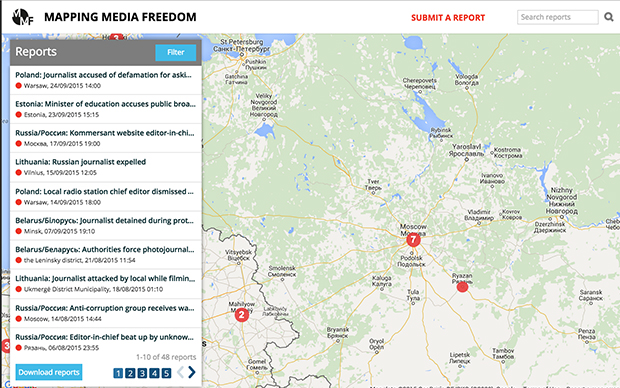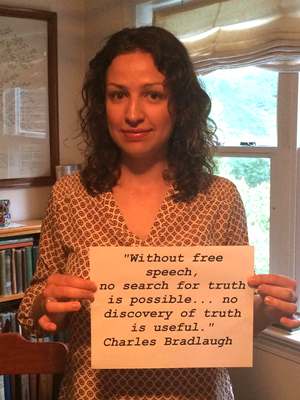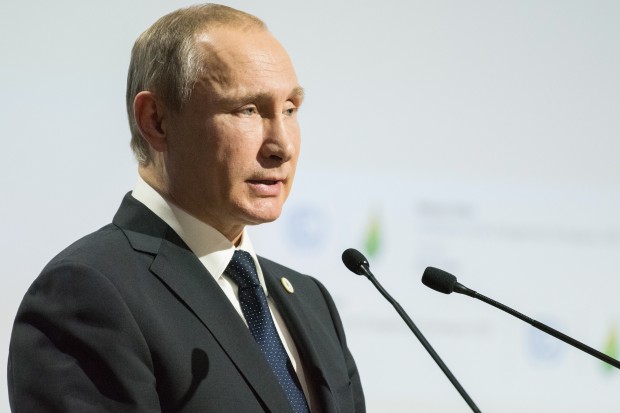22 Dec 2015 | Europe and Central Asia, Mapping Media Freedom, mobile, News, Russia, Turkey
Before 24 November, Turkey was described in Russian news reports as a reliable partner in ambitious projects (TurkStream pipeline, construction of Sochi’s Olympic venues), a source of fruits and vegetables in a period of European food embargoes and Crimea blockade, and one of the main tourist destinations, visited annually by over three million Russians.
But after the downing of the Russian fighter jet, Turkey became the target of a new information war. Reports on estimated growth of turnover and perks at Turkish resorts in Russian state-run media were replaced by a long list of accusations.
Dmitry Kiselev, the head of a state international news agency Rossiya Segodnya and the anchorperson of a weekly programme Vesti Nedeli accused Turkey of buying oil from the Islamic State, exporting carcinogenic vegetables to Russia and trying to revive the Ottoman Empire. Vladimir Soloviev, a popular anchorperson on television channel Rossiya 1, labeled Turkey a sponsor of terrorism.
All media platforms, directly or indirectly controlled by the state, were used in the construction of an image of a new enemy. The past was revised by articles, recalling a long history of Russian-Turkish wars and crimes of the Ottoman Empire. The future was programmed by analysing chances in a possible third world war. Coverage of current affairs has become far from unbiased. News selection has been focused on demonstration of Russia’s sanctions effects and Turkey’s internal problems — oppression of journalists, a growth of child marriage and crime.
After weeks under information attack, on 3 December, Turkish Prime Minister Ahmet Davutoglu dismissed the allegations by Russian media as “lies of this Soviet-style propaganda machine”.
“In the Cold War period, there was a Soviet propaganda machine. Every day it created different lies. Firstly, they would believe them and then expect the world to believe them. These were remembered as Pravda lies and nonsense,” he said.
Days later the Russian state news agency RIA Novosti proved his point by using a classic Soviet propaganda trick. In an op-ed that called Davutoglu “Reich Minister”, RIA Novosti compared the new enemy to the old by appealing to one of the most loathed images for all Russian people since the WWII – Nazi Germany.
This method, as with many others used against Turkey, has been tested and mastered during the Ukrainian crisis. Maidan activists, who later became a new elite of the country, were also labeled by Russian television channels as “fascist nationalists” and “extremists”. The technology of information war, the main propaganda mouthpieces and the image of the enemy remain the same.
On 7 December, Russian Public Opinion Research Center (VTsIOM) published the results of its survey, saying that 73% of Russian population have changed their attitude to Turkey to the worse since the downing of Su-24.
VTsiom, whose director admitted that the main clients of the center are the Kremlin and the ruling party United Russia, has been criticised for manipulation. The results of the survey are symptomatic. If the data is correct, it demonstrates that anti-Turkey propaganda works very well. If the results were rigged in favour of the Kremlin’s agenda, it shows the desirable goal of the information attack.
The day after, on 8 December, a film crew from Russia’s state television channel Rossiya 1 was detained in the Turkish province of Hatay, close to the Syrian border, and deported from the country because of “violations of regulations of work of foreign journalists in the Turkish Republic”. The Ministry of Foreign Affairs of the Russian Federation responded with harsh critiques, accusing Turkey of “a series of infringements of the rights of local and foreign journalists”.
However, in a communique by OSCE Representative on Freedom of the Media on propaganda in times of conflicts, published last year in reference to a similar case related to the Ukrainian crisis, Dunja Mijatović made it clear that censoring propaganda is not the way to counter it. The best way to neutralise propaganda is balance and accuracy in broadcasting, independence of media regulators, prominence of public service broadcasting with a special mission to include all viewpoints, a clear distinction between fact and opinion in journalism and transparency of media ownership.
A similar view was expressed in a speech by Agnès Callamard, the former executive director of ARTICLE 19, delivered at UN Headquarters in December 2014.
“Hatred needs and is fed by censorship, which, in turn, is needed to nurture incitement to the actual commission of atrocity crimes. The lesson is clear: In our efforts to prevent mass atrocities, the free flow of information and freedom of expression are ultimately are our key allies – not our enemies.”
13 Nov 2015 | Mapping Media Freedom, mobile, News, Russia

When the Tomsk-based station TV-2 ceased broadcasting earlier this year, Siberia lost one of its few independent stations. The channel was about as free as media can be in Russia: it wasn’t funded by a state or municipal budget.
The road to its closure began in April 2014 when an antenna malfunctioned. It took 45 days to get back on the air. When it resumed transmission in June 2014, Roskomnadzor – the Russian authority that oversees media and communications – revoked the station’s right to broadcast. A previous licence extension though 2025 had been issued as a result of a “computer error”, the agency explained.
On 1 January 2015, the station stopped broadcasting over the airwaves. In February 2015, it ceased to be an internet and cable station as well.
In Russia, independent media will not likely be shuttered because of critical coverage of the state. It will have its licence revoked because glitch or be silenced through a broken feeder or some other mundane technicality.
Early in the Putin era, Moscow-based national networks could be caught in a “dispute of economic entities” to silence narratives that were contrary to the government’s line. Media takeovers by businesses aligned with the government of President Vladimir Putin drew the world’s attention and criticism. But in Russia’s hinterland, the decline of media freedom was more precipitous.
Despite a professed respect for the rule of law in Russia, regional media outlets are caught between harsh oversight by local authorities and a lack of independent sources of funding. At the same time, business interests and regional governments are often more closely affiliated than in larger cities. Nepotism and conflicts of interest are rife while courts are hamstrung by corruption.
Journalists are often victims. According to Glasnost Defense Foundation, 150 journalists were killed in Russia during last 15 years. Authorities ignored crimes against journalists and tightened the screws by criminalising slander, which spurred lawsuits that helped destroy independent-minded free media.
When journalists do uncover corruption, regional authorities act to silence them by meting out punishment for “crimes” that the individual has committed. This is highlighted by the recent case of Natalya Balyakina, editor-in-chief of the newspaper Chaikovskie Vedomosti. A well-known journalist who investigated allegations of misconduct by local officials involving the area’s municipal housing and human rights violations, Balyakina was awarded the 2007 Andrey Sakharov prize for journalism.
On 22 October 2015, the Chaikovski city court sentenced her to three years of incarceration and 761,000 rubles ($11,818) in fines and damages. Balyakina was convicted of a crime that she allegedly committed five years ago, when she was director of the regional City Managing Company. Her former company has accused her of misappropriation and embezzlement.
Whether or not the allegations against Balyakina are true, Chaikovski regional authorities benefit by having yet another investigative journalist silenced.
Regional media must also contend with a dearth of independent funding. As a result, these outlets are often forced to sign affiliation agreements with local administrators. These deals come with restrictions on how the organisations can cover regional government activities.
Journalists reporting for these affiliated outlets say they receive direct instructions on what they can write about. The editor-in-chief of one newspaper was prohibited from publishing any issues regarding healthcare because there was nothing positive to cover. Regional events that are reported by national media — disasters or human rights violations — are not covered by local outlets due to positive news restrictions.
But even the cowed national media is under continued assault. The Russian Duma is considering a bill that will allow Roskomnadzor to compel media organisations to disclose foreign funding or material support. So software provided by Microsoft could cause a regional outlet to be labelled as a “foreign agent” on the same model of the NGO law that was passed in 2012.
Long under pressure from official censorship and self-censorship, journalists’ sources are now being constrained by punitive laws that have enlarged state secrets and toughened punishments. In June 2015, Putin signed a law that classified Ministry of Defence casualties during peacetime. The result is that journalists are now forbidden from reporting on the number of Russian soldiers killed in action in Ukraine or Syria.
The Federal Security Service (FSB) is also lobbying members of the Duma to pass a draft law that restricts freedom of information around real estate transactions. Some observers say that this will hinder work to uncover corruption committed by Russian officials carried out by bloggers and journalists.
The media in Russia became one of the core targets during the strengthening political powers in last decades, but the regional journalists are put in an especially weak position.
This is one of a series articles on Russia published today by Index on Censorship. To read about the chilling effect blasphemy laws have had on free speech in Russia, click here.
Mapping Media Freedom
Click on the bubbles to view reports or double-click to zoom in on specific regions. The full site can be accessed at https://mappingmediafreedom.org/
|
This article was posted at indexoncensorship.org on 13 November 2015
9 Oct 2015 | Europe and Central Asia, Mapping Media Freedom, mobile, News, Russia

The return of Vladimir Putin as president of the Russian Federation in 2012, after a wave of protests, was followed by the implementation of a new law that required non-governmental organisations receiving foreign support — in the form of funding or material aid — and engaged in “political activity” to register as “foreign agents” with the Ministry of Justice.
There are currently eight organisations advocating for media freedom and journalists’ rights included on a black list of 86 NGOs. Among them are organisations fighting for access to information (Freedom of Information Foundation), providing legal support to journalists (Rights of the Media Defence Centre and Media Support Foundation (Sreda)), organising education for regional reporters (Press Development Institute – Sibir in Novosibirsk and Regional Press Institute), an information agency (Memo.ru) and others.
Foreign agents have additional responsibilities and duties, including having to report twice as often and providing more information to the Ministry of Justice than other NGOs. A notice reading “Published by an NGO – foreign agent” must mark everything they publish, although some refuse to comply. In the Russian language, “foreign agent” has strong negative connotations associated with Joseph Stalin’s Soviet-era political repression. Some would say the term implies that NGOs are spies or traitors.
Only one organisation in Russia had voluntarily identified itself as a foreign agent before July 2014 when new rules allowed the Ministry of Justice to put NGOs on the list as it sees fit.
Some of the media freedom organisations are in the process of shutting down, including Sreda and Freedom of Information Foundation, while others, such as the Regional Press Institute (RPI) in St Petersburg, continue their activities but are forced to pay large fines.
Anna Sharogradskaya, the director of RPI, says she would never register the NGO voluntarily. “Article 51 of the Russian constitution says that nobody is obliged to give incriminating evidence against himself or herself and labeling the RPI would be not only incriminating evidence, it would be slander on our donors,” Sharogradskaya says. “So why should I break the law?”
Since 1993, RPI has provided seminars for journalists from Russia’s northwest region, offered its facilities as a venue for independent press conferences and meetings, and organised discussions on topical issues.
The organisation has come under increasing state pressure. In June 2014, customs officers at the Pulkovo International Airport in St Petersburg detained Sharogradskaya and searched her luggage. She missed her flight to the USA where she had been visiting scholar at Indiana University. Her notebook, memory stick and other gadgets were confiscated without explanation. For more than 10 months, Sharogradskaya was suspected of terrorism and extremism, after which she was cleared of all charges and her belongings were returned — although not in working order.
In November 2014, Putin promised that the St Petersburg regional Ombudsman Alexander Shishlov would look into the RPI case. “And he did: some days after this meeting, the Ministry of Justice put my organisation on the list of foreign agents,” says Sharogradskaya.
A court in St Petersburg fined RPI 400,000 rubles ($6,150) for refusing of add itself to the list voluntary. Half of the amount was paid by Russian and international journalists around the world, and the rest was added from Sharogradskaya’s personal savings.
Despite the pressure, RPI continues acting as an independent help desk for journalists, giving the region’s media, bloggers, initiative groups, democratic opposition leaders, and activists an opportunity to raise their voice at press conferences, and advocating for those who are in trouble with the authorities.
Many, including Sharogradskaya, believe that Russian civil society, including the media, faces increasing pressure. NGOs advocating for the freedom of the press must now spend more time and efforts protecting themselves instead of protecting journalists and other parts of the media.
Sharogradskaya says that above everything else, the lack of solidarity among journalists is a major concern. “Our work is to raise this solidarity. This is the only way to withstand the time of repressions.”
Mapping Media Freedom
Click on the bubbles to view reports or double-click to zoom in on specific regions. The full site can be accessed at https://mappingmediafreedom.org/
|
20 Aug 2015 | mobile, News, Russia, Youth Board
This is the eighth of a series of posts written by members of Index on Censorship’s youth advisory board.
Members of the board were asked to write a blog discussing one free speech issue in their country. The resulting posts exhibit a range of challenges to freedom of expression globally, from UK crackdowns on speakers in universities, to Indian criminal defamation law, to the South African Film Board’s newly published guidelines.

Anastasia Vladimirova is a member of the Index youth advisory board. Learn more
On July 29, Russia’s independent media support fund, Sreda, announced it would be liquidated due to lack of funding.
Russia’s Ministry of Justice declared the fund a “foreign agent” after its mandatory check into the organisation’s finances.
Direct interference by the Russian government became possible in 2012 after President Vladimir Putin approved a law requiring all non-governmental organisations that receive foreign funding and engage in vaguely defined political activity to register as foreign agents with the Russian Ministry of Justice.
Since its inception, however, Sreda had received money from Dmitry Zimin, a Russian entrepreneur and investor in science and education, whose nonprofit foundation Dynasty closed earlier this year due to the scrutiny imposed by the Ministry of Justice under the same law. Given the absence of foreign funding, the liquidation of Sreda is an example of Russia’s ruthless crackdown on independent media masquerading as a legal fight against the alleged foreign influence on Russia’s political and civic life.
Colta, Novaya Gazeta and TV Rain Channel are just a few examples of Sreda’s now former grantees that struggle to keep up their independent voices in the media landscape dominated by state-sponsored outlets.
Anastasia Vladimirova, Russia
Related:
• Simeon Gready: An over-the-top regulation policy
• Ravian Ruys: Without trust, free speech suffers
• Muira McCammon: GiTMO’s linguistic isolation
• Jade Jackman: An act against knowledge and thought
• Harsh Ghildiyal: Defamation is not a crime
• Tom Carter: No-platforming Nigel
• Matthew Brown: Spying on NGOs a step too far
• About the Index on Censorship youth advisory board
• Facebook discussion: no-platforming of speakers at universities




